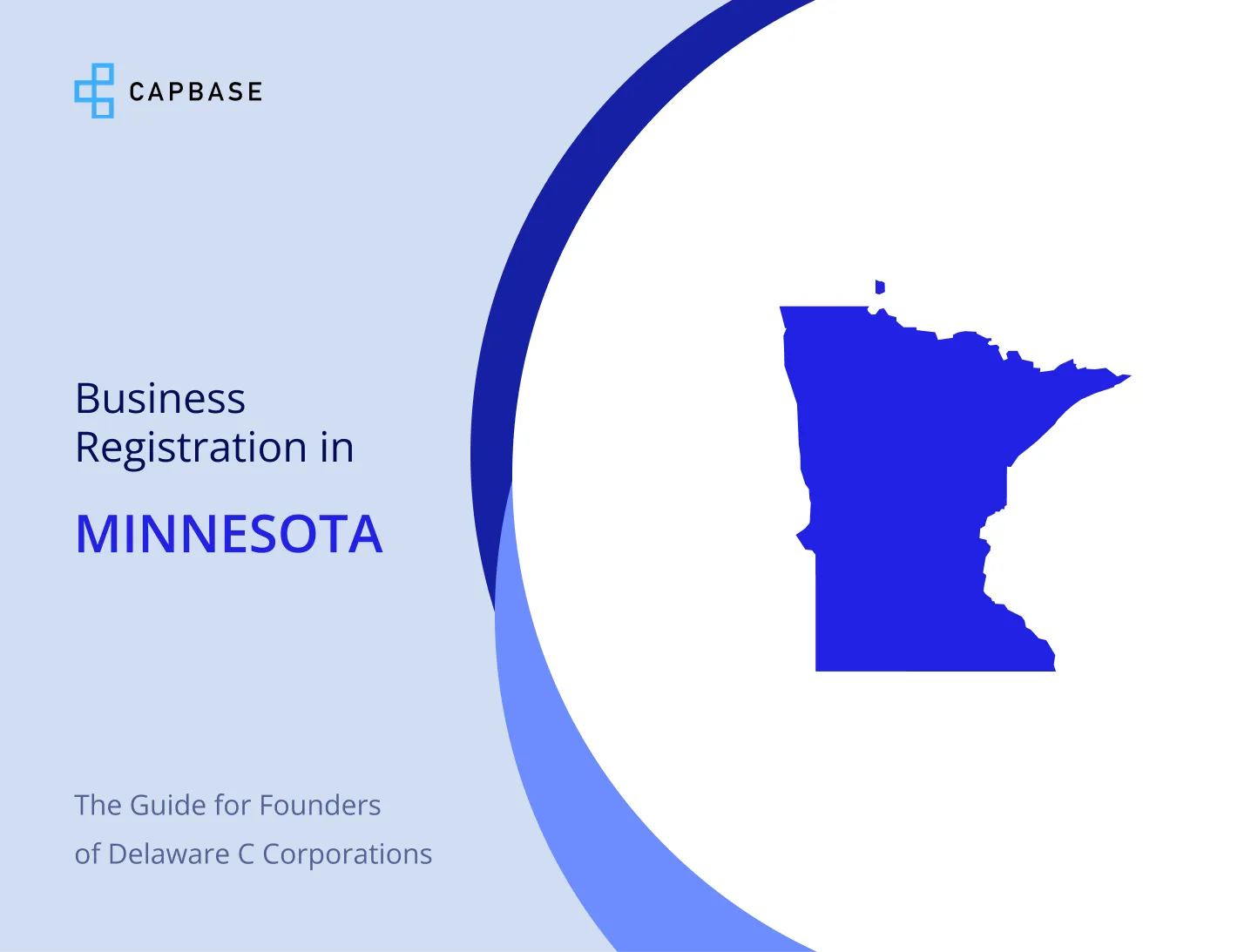
Doing Business in Minnesota: Foreign Entity Registration for Startups & Corporations
 by Capbase Staff • 7 min readpublished September 23, 2022 • updated December 4, 2023
by Capbase Staff • 7 min readpublished September 23, 2022 • updated December 4, 2023
Related

Stay ahead of the curve
You’ll get actionable advice, comprehensive guides, interviews with founders, and more.
When you’re starting a business, you’re probably going to incorporate some sort of legal entity for it. Chances are, if you’re starting a startup and have the intention of raising money or being able to more easily sell the company in the future, a C Corporation is the right choice. As for where you should form your C Corporation, there’s no better domicile than Delaware due to its extensive business case law and business-friendly regulations.
You can incorporate a Delaware corporation from (virtually) anywhere in the world, but let’s say you’re starting up in Minnesota. If you do business in Minnesota, you need to register with the state. This article aims to explain the foreign corporation registration process so you’re ready to get set up in Minnesota.
But first, how can you tell whether you’re legally doing business in Minnesota?
When to register as doing business in Minnesota
Delaware C corps—and all other business entity types formed outside of Minnesota—are referred to as foreign entities or Minnesota foreign corporations by the State.
Like many states, Minnesota doesn’t have a positive definition of what constitutes “doing business.” That said, some legal cases provide precedent on the “doing business” question:
- Paulos v. Best Securities, Inc.109 N.W.2d 576. Deemed that a foreign corporation is “doing business” if it enters into a contract with a resident, wherein the specified work is to be conducted (in whole or in part) within the state.
- In State by Spannaus v. Mecca Enterprises, Inc. 262 N.W.2d 152. Courts determined a salesperson to be an employee of someone who has the authority to direct how the sale is made and how the desired outcome is to be achieved. The ruling found that Mecca exercised sufficient control over its field representatives to be considered an employment relationship (and thus “doing business”) instead of an independent contractor relationship. Whereas an employer has control over the manner in which work is performed, the findings indicate that an independent contractor is “one who agrees to achieve a given result but is not subject to the orders of another as to the method or means to be used.”
- Dahl v. Collette 202 Minn. 544. Deemed that the corporation is doing business when engaged in the manufacture and sale of butter cartons. The case found that the corporation regularly and systematically solicited orders for transmission to its principal place of business located outside the state for acceptance or rejection. Due to the order details transmitted out of state, the result was “a continuous flow” of the corporation’s products into the state, and that agents of the corporation “habitually adjusted and compromised disputes with its customers in this state, and that its agents represented it and displayed its wares at conventions in this state [of Minnesota].”
There are a number of activities which are explicitly exempt from the “doing business” classification, according to 2020 MN Statute 303.03:
- Maintaining or defending any action or suit or any administrative or arbitration proceeding, or effecting the settlement thereof or the settlement of claims or disputes;
- Holding meetings of its directors or shareholders or carrying on other activities concerning its internal affairs;
- Maintaining bank accounts;
- Maintaining offices or agencies for the transfer, exchange, and registration of its securities, or appointing and maintaining trustees or depositaries with relation to its securities;
- Holding title to and managing real or personal property, or any interest therein, situated in this state, as executor of the will or administrator of the estate of any decedent, as trustee of any trust, or as guardian of any person or conservator of any person's estate;
- Making, participating in, or investing in loans or creating, as borrower or lender, or otherwise acquiring indebtedness or mortgages or other security interests in real or personal property;
- Securing or collecting its debts or enforcing any rights in property securing them; or
- Conducting an isolated transaction completed within a period of 30 days and not in the course of a number of repeated transactions of like nature.
When to register to collect sales tax in Minnesota
Every state has rules about when a company is required to pay sales tax. These are called sales tax nexus rules.
You can think of the nexus as a special version of that state’s border; if you perform certain business activities within that border, you fall into the state’s sales tax nexus, and you’re required to register for and collect state sales tax.
Typically, these actions take the form of buying and selling goods and services. Minnesota, like most states with a sales tax, has basically always imposed a sales tax on physical goods, with certain categories of goods like grocery foods exempt from taxation.
Until 2018, selling or buying non-physical goods—like subscriptions to streaming services, SaaS memberships, etc.—did not, generally speaking, qualify you for sales tax nexus. After the 2018 Supreme Court decision South Dakota v. Wayfair, Inc., that changed. Now, if you buy or sell non-physical goods or services in a state, you may fall within an “economic nexus” which requires you to register and collect sales taxes.
As usual, this isn’t legal advice—just a guide. If you’re not 100% clear on whether you fall within Minnesota’s sales tax nexus, it’s best to confer with your legal counsel and/or an accountant that has expertise in Minnesota’s legal code and tax regulations.
Minnesota sales tax nexus (physical goods and property)
If you have physical presence (sometimes also known as a “physical nexus”) in Minnesota, then you will likely need to collect and remit sales tax. According to the Minnesota Department of Revenue, you are physically present in a state if you have warehouses, retail spaces, or employees and/or representatives of the business in the state.
You may have a physical nexus in Minnesota if your company:
- Directly or through a subsidiary, have an office, distribution, sales, or sample room location, warehouse, or other place of business in Minnesota.
- Has a permanent or temporary representative, agent, salesperson, canvasser, or solicitor in Minnesota for the purpose of repairing, selling, delivering, installing, soliciting orders for the retailer's goods or services, or leasing tangible items;
- Delivers items into Minnesota in its own vehicles and providing taxable services in the state
- Have entered into an agreement with a Minnesota-based solicitor for the referral of customers in exchange for a commission, and your annual gross receipts exceed $10,000.
You will need to pay sales tax as long as you have physical presence regardless of any minimum thresholds. You can learn more about physical presence for sales tax purposes through the State’s website.
Minnesota sales tax nexus (non-physical goods and property)
The new state sales tax laws applying to non-physical (ie. internet) sales allow you to qualify for sales tax nexus even without physical presence or goods. In Minnesota, you need to cross a certain threshold to qualify.
You will need to collect and remit sales tax if you do the following in the current or previous year:
- Collect $100,000 or more in retail sales from Minnesota; or
- Have 200 or more separate transactions into Minnesota
If you would like to take a deep dive, you can check out the State’s website.
Registering for sales tax in Minnesota
If you meet the requirements to collect sales tax in Minnesota, you will need to register with the Minnesota Department of Revenue. You can register to collect sales tax in Minnesota through the Business Tax Registration portal.
How to register your non-Minnesota business with the State of Minnesota
- Select a corporation name under which to do business. This doesn’t have to be the name you registered when incorporating in Delaware, but it can be. If the name you’d like to use is already taken by another business entity, you must register the company under an assumed name (also known as a DBA name or alternate name).
- Fill out an application. You’ll need to file a request for a Certificate of Authority to Transact Business in Minnesota (a.k.a. a “Minnesota Certificate of Authority”) to the office of the Minnesota Secretary of State along with a Delaware Certificate of Good Standing.
- Pay the filing fee. Registering online or submitting paperwork in-person to the Minnesota Secretary of State incurs a filing fee of $220. Submitting registration by mail costs $200.
- Submit your Certificate of Authority to Transact Business in Minnesota.
- Wait. Processing typically takes two to four weeks.
Once you’re approved to operate as a qualified foreign business in Minnesota, you’ll need to comply with certain requirements.
Compliance as a Qualified Foreign Business in Minnesota
To stay in compliance and continue legally doing business in Minnesota, you need to meet two requirements: maintaining a registered agent and filing your annual renewal. On top of that, you will also need to pay a corporation franchise tax.
Registered agent in Minnesota
Your registered agent in Minnesota is your point of contact with local and state agencies. If you don’t have a physical office address for your Minnesota business, it may be advantageous to find a registered agent to receive state notices and service of process on your behalf.
Foreign corporations are required to have a registered office in Minnesota. The office cannot be a P.O. box, rather it must be a physical address (e.g. the street address) of your registered agent or a licensed registered agent service.
Your registered agent will forward any important information, such as business mail, to you. There are a number of firms that contract out registered agents. They typically cost $50 – $100 per year.
Annual review in Minnesota
The annual renewal in Minnesota is similar to the annual report in most other states. Every calendar year, you must file a statement with the State, updating any changes to the company address or the composition of the Board and officers. You’ll include info like:
- The legal name of your business
- The name and address of your registered agent
- The names and addresses of board members, managers, and officers
As long as your business is active and in good standing with the Minnesota Secretary of State then there is no filing fee for your annual renewal.
Paying your corporation franchise tax
Minnesota has a corporation franchise tax. You will need to pay this tax if you either:
- Are located in Minnesota,
- Have a business presence in Minnesota,
- Have Minnesota gross income
For more information on filing and paying your corporation franchise tax, please see the following guidance from Minnesota’s Department of Revenue.
Hiring and paying employees in Minnesota
When you hire a new employee in the state, federal and Minnesota statutes require that you report new hires within 20 days of a new employee’s hire date. You can report your new hires online.
Your payroll provider should be able to take care of paycheck withholdings, but it’s up to you to register as an employer with the State and set up an online employer account.
For a comprehensive guide of your responsibilities, Minnesota provides the following information.
The Easiest Way To Register Your Business In Minnesota
To register your business in Minnesota, you’ve got to keep track of a lot of moving parts. Failing to file the right forms, provide the right information, or stay on top of compliance laws can lead to serious headaches.
Capbase makes it easy. When you incorporate your Delaware corporation on Capbase, we will generate the required information needed to register to do business in Minnesota and keep you up to date on any required filings.
The compliance calendar inside your Capbase account will notify you of upcoming fees, reporting, or other requirements, so you can keep your startup in good standing with Minnesota state authorities.

Written by Capbase Staff
Capbase is a team of designers, engineers, and business professionals spread across 6 time zones on 3 continents united by our passion for dogs, coffee, and great software.
Related
American Samoa Business Entity Registration for Delaware Corporations
Is your company doing business in American Samoa? Get an easy-to-follow explanation about what forms you’ll need, information about registration fees, filing deadlines, naming requirements, and more.
 by Capbase Staff • 7 min read
by Capbase Staff • 7 min readRegistering Your Startup To Do Business In West Virginia
Is your company doing business in West Virginia? Get an easy-to-follow explanation about what forms you’ll need, information about registration fees, filing deadlines, naming requirements, and more.
 by Capbase Staff • 7 min read
by Capbase Staff • 7 min readRegistering Your Startup To Do Business In Maine
Is your company doing business in Maine? Get an easy-to-follow explanation about what forms you’ll need, information about registration fees, filing deadlines, naming requirements, and more.
 by Capbase Staff • 7 min read
by Capbase Staff • 7 min read